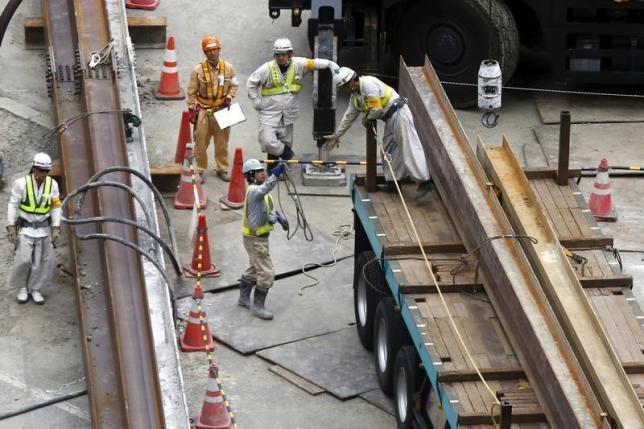Japan economy shrinks in quarter two in setback for 'Abenomics'

TOKYO - Japan's economy shrank at an annualised pace of 1.6 percent in April-June as exports slumped and consumers cut back spending, adding pressure on Prime Minister Shinzo Abe to step up his policy drive to lift the economy out of decades of deflation.
China's economic slowdown and its impact on its Asian neighbours has also heightened the chance that any rebound in growth in July-September will be modest, analysts say.
The gloomy data adds to signs that Japan's economy is at a standstill and heightens pressure on policymakers to offer additional monetary or fiscal stimulus later this year.
The contraction in gross domestic product (GDP) compared with a median market forecast of a 1.9 percent fall and followed a revised expansion of 4.5 percent in the first quarter, Cabinet Office data showed on Monday.
"If weak private consumption persists, that would be a further blow to Abe's administration, which is facing falling support rates ahead of next year's Upper House election," said Hiromichi Shirakawa, chief Japan economist at Credit Suisse.
"This could raise chances of additional fiscal stimulus."
Private consumption, which makes up roughly 60 percent of economic activity, fell 0.8 percent from the previous quarter, double the pace expected by analysts.
It was the first decline since April-June 2014, when a sales tax hike hit consumption, as households spent less on air conditioners, clothing and personal computers.
Overseas demand shaved 0.3 percentage point off growth as exports to Asia and the United States slumped.
ONUS ON GOVT, NOT BOJ
The data looks likely to force the BOJ to cut its forecast of a 1.5 percent economic expansion for the current fiscal year when it reviews its long-term projections in October.
But the weak consumption underscores a dilemma the central bank faces that may discourage it to expand stimulus.
Economics Minister Akira Amari acknowledged that consumption may have been hit by rising food prices, as the BOJ's easing weakened the yen and pushed up import costs.
Aides close to Abe have signalled that additional monetary easing is unwelcome as further yen falls will push up food costs further and hurt consumption.
That puts the onus of the government to underpin growth despite diminishing returns. Japan's economy grew just 2 percent since Abe took office in December 2012, even as he deployed fiscal stimulus roughly equal to 3 percent of GDP.
"The effect of Abenomics hasn't expired, but the policy steps haven't boosted wages enough to meet rising living costs," said Yuichiro Nagai, an economist at Barclays Capital Japan.
"There's not much the BOJ can do, so there's a higher chance the government may offer fiscal support if consumption fails to rebound in July-September," he said.
Economics minister Amari told reporters the government didn't have any plans as yet to craft a fresh stimulus package, and will instead keep pressuring companies to direct their record profits at raising wages and capital expenditure.
But weak Asian demand casts doubt on whether manufacturers can continue to reap huge profits overseas.
Kobe Steel Ltd (5406.T), Japan's No.3 steelmaker, last month cut its annual sales forecast for the year to March 2016, blaming weak sales of hydraulic excavators in China.
"We don't expect to see a recovery in infrastructure investments and capital spending in China within a year or a year and a half," Kobe Steel executive vice president Naoto Umehara told reporters at the earnings announcement. -Reuters







